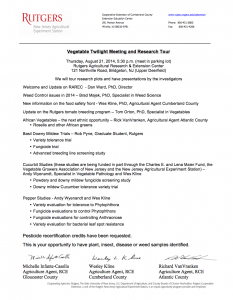A number of calls have come in about options to control large Palmer in full-season soybeans. The beans are 30 to 36 inches tall and the Palmer amaranth plants are poking through the canopy. In most cases the field has been sprayed with glyphosate. There are no good options. Late-season Palmer amaranth management needs to focus on stopping seed production, and chemical choices are likely to be ineffective.
[Read more…]
Commercial Ag Updates + Farm Food Safety
Rutgers Cooperative Extension Ag Agents provide updates on what they see in the field, upcoming events, and other important news that affects your operation, such as developments in on-farm Food Safety. Subscribe if you wish to be notified about workshops, meetings, and upcoming commercial ag events.
Subscriptions are available via EMAIL and RSS.
Late-Season Palmer Amaranth Management: Focus on Stopping Seed Production
Vegetable Twilight Meeting & Field Tour
Date: Thursday, August 21, 2014 5:30pm
Location: RAREC, 121 Northville Rd, Bridgeton, NJ
Join Rutgers for a twilight meeting in the field to learn about recent innovations for successful control of key vegetable diseases and weeds. Pesticide credits have been requested.
This is your opportunity to bring plant, insect, disease or weed problem samples for identification. Rutgers Cooperative Extension Ag Specialists and County Agents will be on hand for the field tour of research and demonstration plots on managing diseases of pepper, basil downy mildew, and cucurbit downy mildew. View weed control innovations and get updates on tomato variety development and ethnic African vegetables.
Weekly Crop Update: Remove Weeds Before Seeds Mature
This week in U Del Weekly Crop Update:
- Remove Weeds Before the Seeds Mature
- Livid Amaranth
Remove Weeds Before the Seeds Mature
Many weeds have started to flower in the past week or two. Weeds, depending on the species, will continue to flower from now until frost. I am often asked how soon after flowering are the seeds mature. We have some ongoing trials looking at this issue, but we have a few preliminary results to share.
First and foremost, seeds are mature shortly after flowering. By this I mean that within two weeks of flowering, the seeds on some plants are capable of germinating and contributing to the weed seedbank. So if you are pulling weeds (or mowing them or spraying them) to stop them from producing seeds, you should physically remove the weeds from the field because they may already have mature seeds.
[Read more…]
Weed Control Options for Double Cropped Soybeans
With small grain harvest underway, there are some questions about preplant weed control with double cropped soybeans. This has always been a challenging situation, and with the presence of herbicide-resistant weeds, it has become even more complicated and results are often less than satisfactory. Larger plants that have been cut off or damaged by the combine are going to be less susceptible to herbicides and achieving 100% control will require a lot of environmental factors falling in your favor — the recent dry spell does not work in your favor. [Read more…]
Farmland Leasing Networking for Landowners and Farmers
Interested in farmland leasing? You’re invited to attend a free farmland leasing networking event for landowners and farmers.
The meeting will be hosted July 24, 2014 from 6 PM to 7:30 PM at Rutgers Cooperative Extension of Burlington County Office, 2 Academy Drive, Westhampton NJ 08060.
To sign up for this farmland leasing networking, contact the SADC at (609) 984-2504 or email Hillary Barile at hillary.barile@ag.state.nj.us.
Weekly Crop Update: Soybean, Winter Wheat, & Barley
- Postemergence Management of Glyphosate-Resistant Horseweed in Soybeans
- Palmer Amaranth Control in Soybeans
- Harvest Aids for Small Grain
Postemergence Management of Glyphosate-Resistant Horseweed in Soybeans
Options for controlling horseweed (marestail) resistant to glyphosate after the soybeans have emerged are very limited. Liberty Link soybeans are an exception, because Liberty 280 is fairly effective on horseweed (be sure to keep your rates up and keep spray volume up to ensure good coverage). [Read more…]

